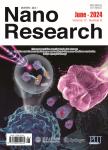Regulation of surface carbides on palladium nanocubes with zeolitic imidazolate frameworks for propyne selective hydrogenation
作者机构:Institute of Functional Nano&Soft Materials(FUNSOM)Jiangsu Key Laboratory for Carbon-Based Functional Materials and DevicesSoochow UniversityNo.199 Ren’ai RoadSuzhou215123China Guangzhou Key Laboratory of Low-Dimensional Materials and Energy Storage DevicesCollaborative Innovation Center of Advanced Energy MaterialsSchool of Materials and EnergyGuangdong University of TechnologyGuangzhou510006China
出 版 物:《Nano Research》 (纳米研究(英文版))
年 卷 期:2021年第14卷第5期
页 面:1559-1564页
核心收录:
学科分类:0808[工学-电气工程] 081704[工学-应用化学] 0809[工学-电子科学与技术(可授工学、理学学位)] 07[理学] 070304[理学-物理化学(含∶化学物理)] 08[工学] 0817[工学-化学工程与技术] 0805[工学-材料科学与工程(可授工学、理学学位)] 0703[理学-化学] 0702[理学-物理学]
基 金:This work was supported by the National Natural Science Foundation of China (Nos. 21703146 and 51802206) Natural Science Foundation of Jiangsu Province (No. BK20180846) We also acknowledge the financial support from the 111 Project, Joint International Research Laboratory of Carbon-Based Functional Materials and Devices, Collaborative Innovation Center of Suzhou Nano Science and Technology (NANO-CIC) the Priority Academic Program Development of Jiangsu Higher Education Institutions (PAPD),SWC for Synchrotron Radiation. Yong Xu acknowledges the financial support from Guangdong University of Technology
主 题:propyne selective hydrogenation Pd nanocubes zeolitic imidazolate frameworks core-shell nanostructures Pd carbide
摘 要:The selective hydrogenation of propyne to propylene has attracted great attention in chemical industry for removing trace amount of propyne for producing polymer-grade propylene. As the state-of-the-art catalyst, Pd suffers from the disadvantage of poor propylene selectivity due to the over-hydrogenation of propylene to propane. We here demonstrate that Pd nanocubes (NCs) coated by zeolitic imidazolate frameworks (i.e., Pd NCs@ZIF-8) can serve as highly active and selective catalysts for propyne selective hydrogenation (PSH). Benefitting from the unique properties and abundant groups of ZIF-8, Pd carbide (Pd-C) is formed on the surface of Pd NCs after thermal treatment, which acts the active sites for PSH to propylene. More importantly, the content of Pd-C can be precisely controlled by altering the calcination temperature without aggregation of Pd NCs and obvious changes in the framework of ZIF-8. The formation of Pd-C on Pd NCs@ZIF-8 can strongly suppress the H2 adsorption, and thus selectively catalyze propyne to propylene. Consequently, the optimized catalyst (i.e., Pd NCs@ZIF-8-100) exhibits a propylene selectivity of 96.4% at a propyne conversion of 93.3% at 35 °C and atmospheric pressure. This work may not only provide an efficient catalyst for PSH, but also shed a new light on the catalytic application of ZIFs.



